Hole in the Clouds
Nov 3, 2010
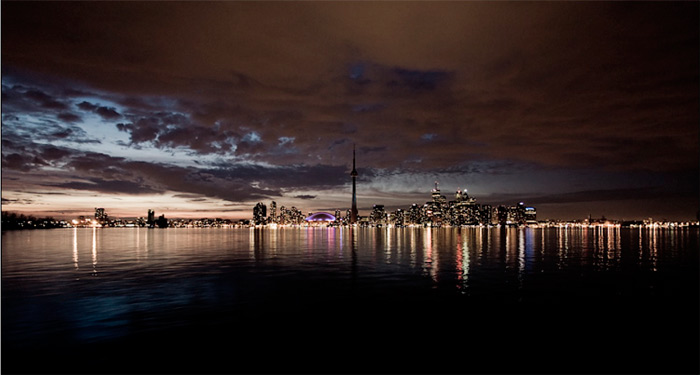
Sam Javanrouh's caption for his nighttime skyline shot was indeed a reference to election results--but not to the mid-term elections at the center of the media universe here in the U.S.
Javanrouh was unhappy about last week's mayoral election in Canada's largest city, Toronto, where a "right-wing intolerant redneck" named Rob Ford trounced former deputy premier of Ontario George Smitherman. Ford ran openly homophobic ads against Smitherman, who is openly gay. He also promised to cut taxes and stop spending and etc.
The CN tower is dark in this photo, not its usually well-lit self, but that's just a coincidence, not an example of early budget-slashing. Must be Obama's fault.
Canada
cityscape
night
Toronto
Ontario
Rob Ford
George Smitherman
skyline
(Image credit: Sam Javanrouh)
Nov 4, 2010
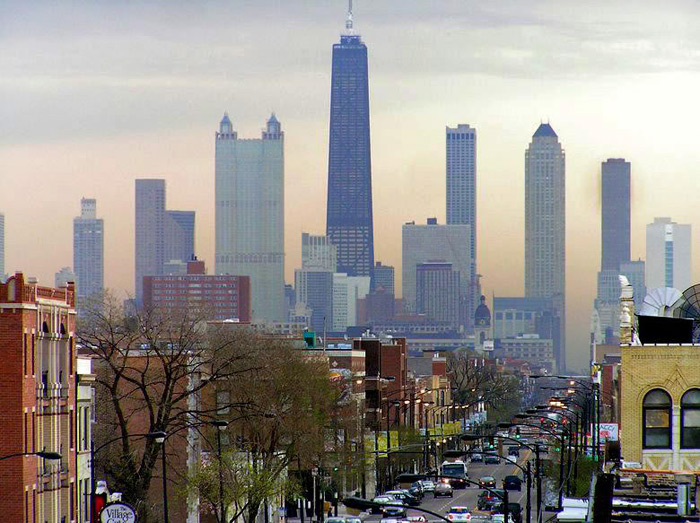
Today and tomorrow our focus is on beautiful Chicago, in scenes captured by the Polish photographer Krzycho. Here, a few blocks north of downtown, the morning sun is coming up over Lake Michigan, behind the skyscrapers, which seem quite artfully arranged.
Krzycho lives and shoots in Chicago but comes originally from Zamość in southeastern Poland. Clearly, he (or she?) is smitten by the windy city.
cityscape
Chicago
dawn
skyline
skyscrapers
clouds
(Image credit: Krzycho)
Nov 7, 2010
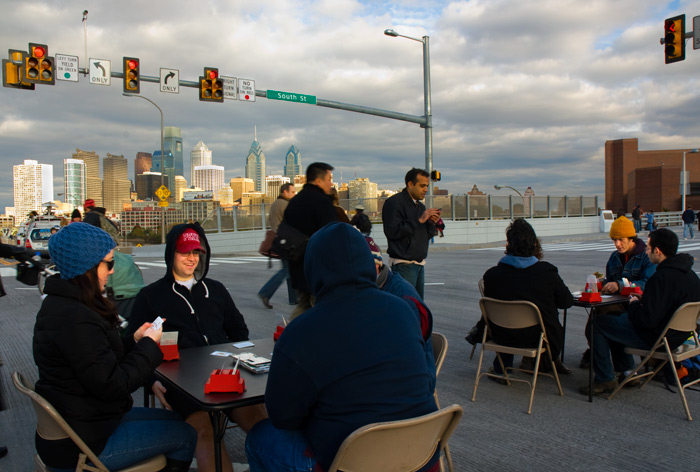
This weekend, the mayor and his guys in suits cut the ribbon reopening the South Street Bridge across the Schuylkill River, after two years of demolition and reconstruction.
For the first few hours, the bridge was only open to foot traffic. So this group of students from the University of Pennsylvania set up card tables in the middle of the roadway and played bridge on the bridge.
Soon after the ribbon-cutting, a small parade marched past the card players, led by the West Powellton Steppers and drum team. Behind them was a ten-foot-tall papier mâché puppet bearing a sign that said "Share the Road." Bringing up the rear--and putting an end to the brief and glorious era of bridge on the bridge--was the first motor vehicle to cross the new span, a Philly CarShare hybrid Prius.
cityscape
streetscape
Philadelphia
bridge
skyline
card game
Nov 17, 2010
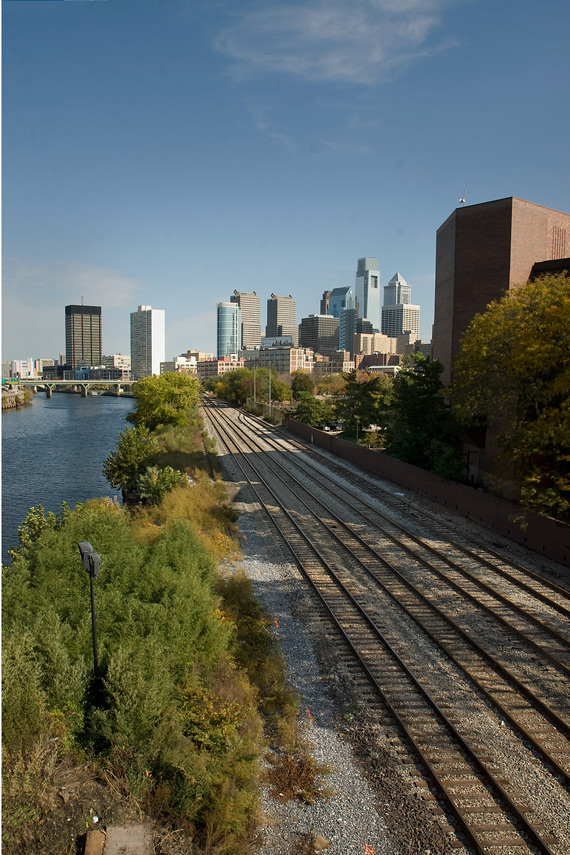
A couple of weeks ago, before the new bridge opened, I snuck out onto it while the workmen were at lunch. When I looked upstream along the Schuylkill, I saw railroad tracks cutting straight through to Center City and beyond, past all those skyscrapers ssoaking up the sun.
cityscape
railroad
Philadelphia
skyline
South Street Bridge
Dec 15, 2010
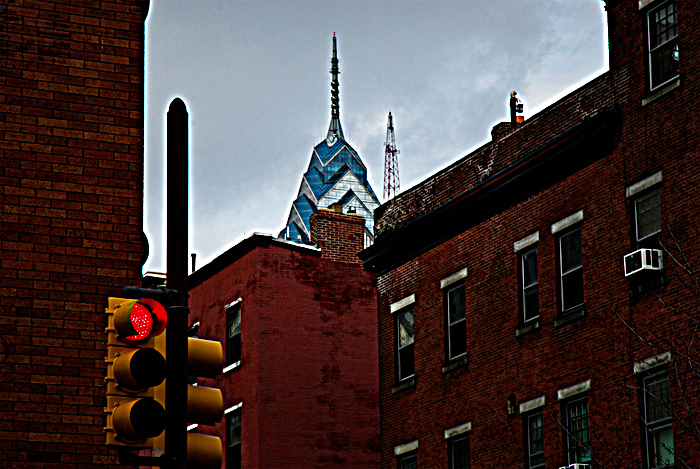
The One Liberty Place tower pokes out from behind the rest of Philadelphia late on a winter afternoon.
cityscape
streetscape
Philadelphia
skyline
One Liberty Place
Feb 28, 2011
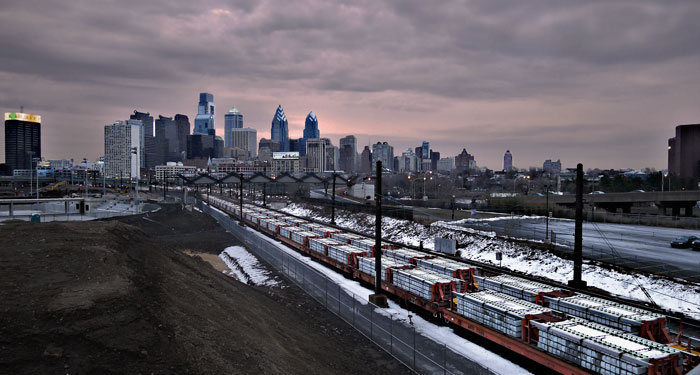 It's not the city's finest season, but it'll do.
It's not the city's finest season, but it'll do.
cityscape
Philadelphia
skyline
trains
South Street Bridge
Aug 11, 2011
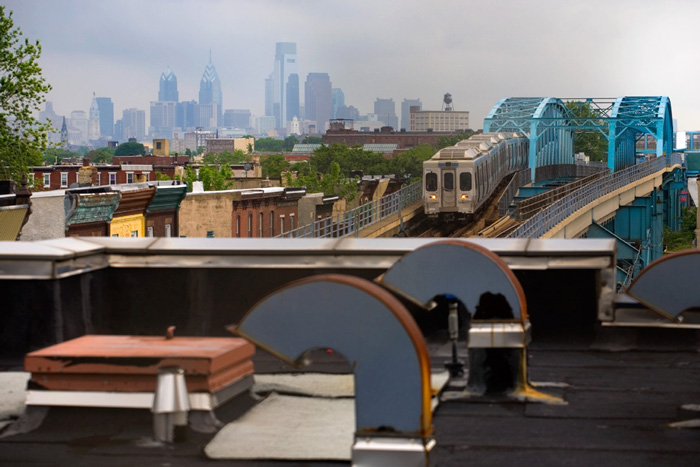 In recent years, gentrification in many Philadelphia neighborhoods has been characterized by construction of new rooftop decks on top of old rowhouses. This view is from a rooftop elevated above the elevated train in the Kensington neighborhood; the rooftop has not yet been completely deckified, but the view is as good as it's going to get.
In recent years, gentrification in many Philadelphia neighborhoods has been characterized by construction of new rooftop decks on top of old rowhouses. This view is from a rooftop elevated above the elevated train in the Kensington neighborhood; the rooftop has not yet been completely deckified, but the view is as good as it's going to get.
cityscape
birdseye view
Philadelphia
skyline
el
Kensington
(Image credit: Bradley Maule)
Dec 18, 2011
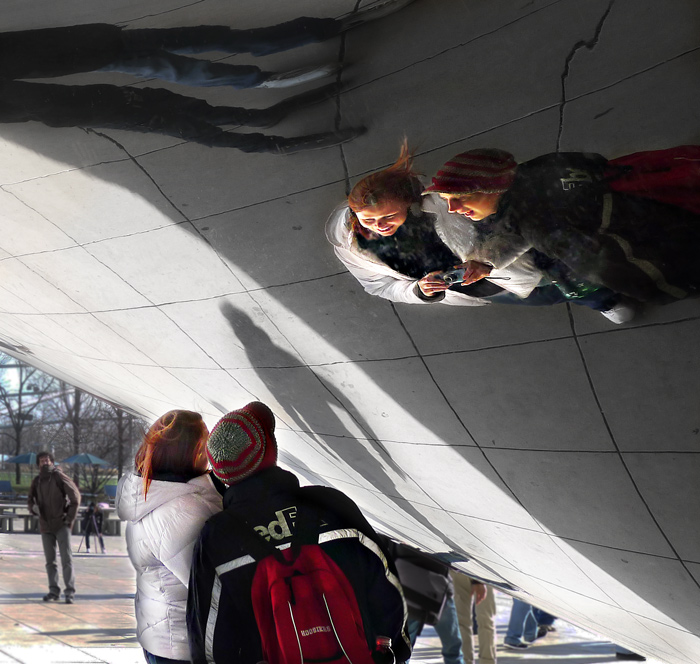 Visitors enjoy their reflections in the bean, in downtown Chicago's Millennium Park, near the waterfront. The couple pictured here can also be seen at lower right in the picture below, when they were first approaching the shiny thing and had not yet found themselves in it. But they're already there, if you look closely, along with the skyscrapers in the background and an ice skating rink in the middle distance.
Visitors enjoy their reflections in the bean, in downtown Chicago's Millennium Park, near the waterfront. The couple pictured here can also be seen at lower right in the picture below, when they were first approaching the shiny thing and had not yet found themselves in it. But they're already there, if you look closely, along with the skyscrapers in the background and an ice skating rink in the middle distance.
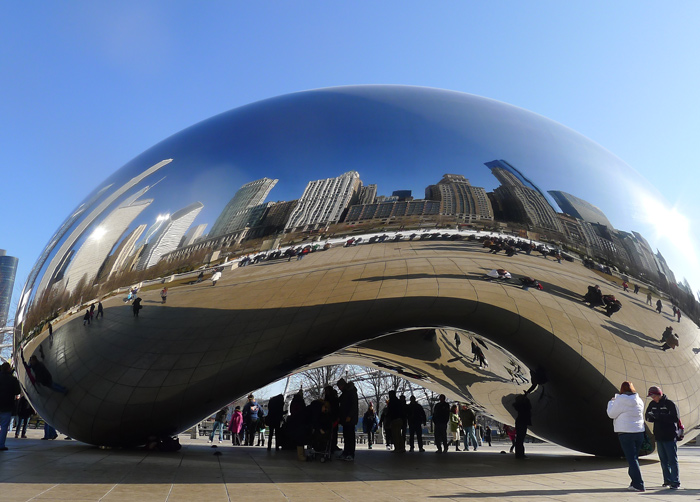
cityscape
Chicago
sculpture
skyline
Millennium Plaza
Grant Park
Cloud Gate
reflections
the bean
parkscape
Jan 6, 2012
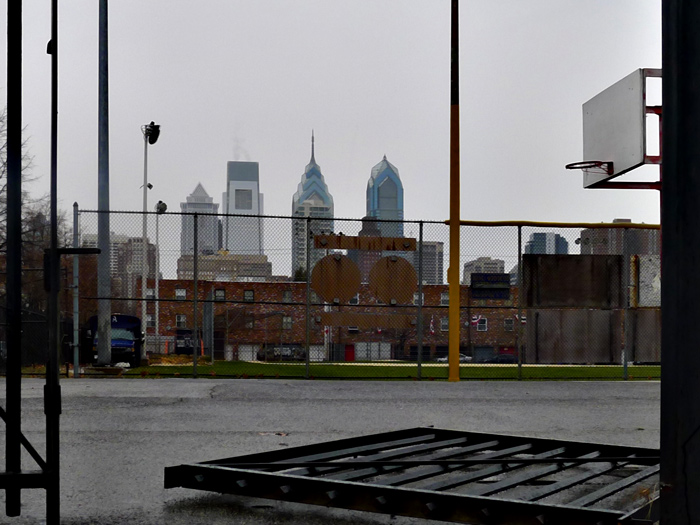 Somebody busted down the gate to the basketball court at Marian Anderson Park in our neighborhood. Behind the court, the meticulously maintained baseball field is protected by a much more secure fence.
Somebody busted down the gate to the basketball court at Marian Anderson Park in our neighborhood. Behind the court, the meticulously maintained baseball field is protected by a much more secure fence.
cityscape
Philadelphia
skyline
park
Marian Anderson Park
playground
(Image credit: Hank Stein)
Apr 19, 2012
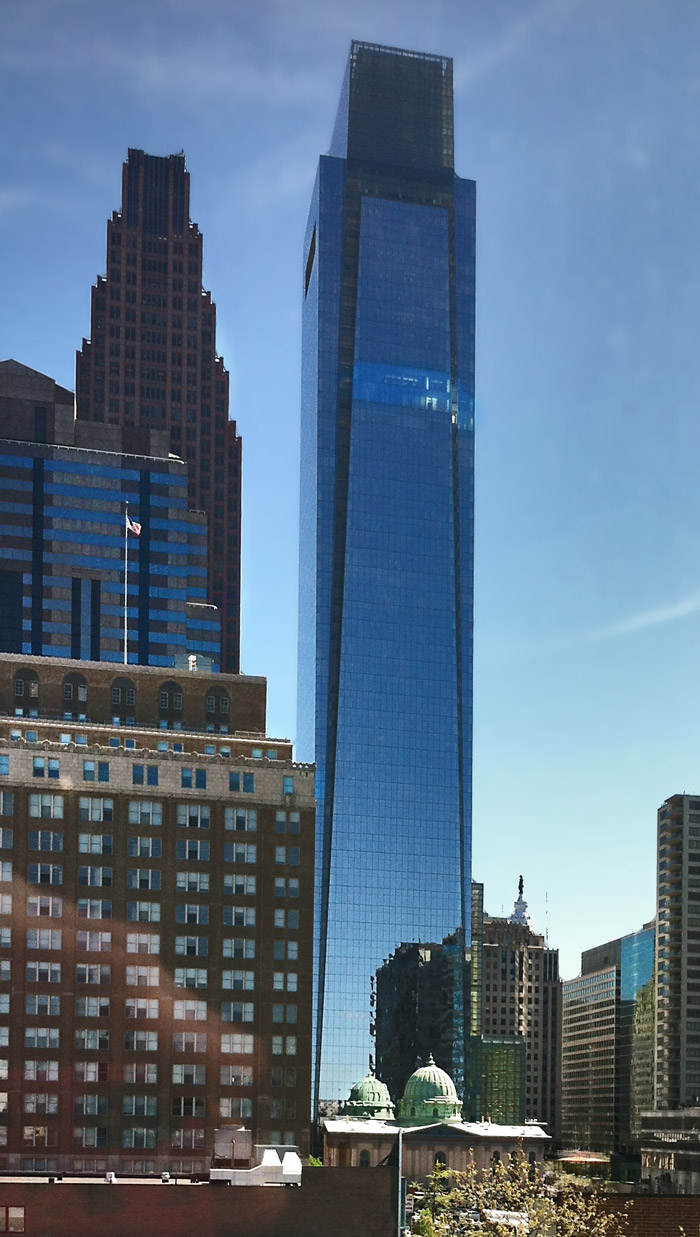 The 199-year-old dome of the Arch Street Presbyterian Church is reflected at the base of the four-year-old Comcast Center office tower, tallest building in Philadelphia and fifteenth-tallest in the United States.
The 199-year-old dome of the Arch Street Presbyterian Church is reflected at the base of the four-year-old Comcast Center office tower, tallest building in Philadelphia and fifteenth-tallest in the United States.
The black cube-like structure at the top of the blue-glass tower is said to be a water tank containing 300,000 gallons of water. The weight of the water–thirteen hundred tons–helps keep the building from swaying in high winds. The Comcast Center's Tuned Liquid Column Damper is touted as the largest watery building-stabilization system in the world.
The 58-story tower is 974 feet high. The cable company uses about 90 percent of the building's one million square feet of office space and leases out the rest.
Comcast touts numerous energy-saving features of the tower, notably including waterless urinals, which were opposed by the plumbers' union. The dispute was resolved by an agreement that included installation of plumbing to all the waterless urinals in case they didn't work out and had to be replaced by conventional urinals.
cityscape
Philadelphia
skyline
Center City
Comcast Center
Arch Street Presbyterian Church
Aug 7, 2012
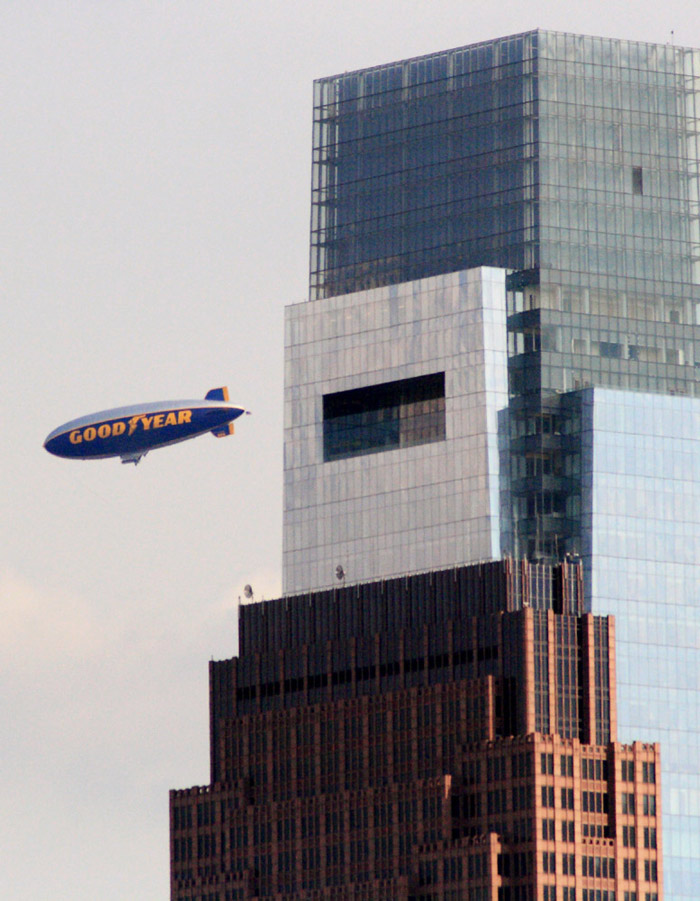 The blimp sails past the Comcast Center, tallest building in Philadelphia.
The blimp sails past the Comcast Center, tallest building in Philadelphia.
streetscape
Philadelphia
skyline
skyscrapers
Comcast Center
blimp
(Image credit: phillytrax)
Nov 2, 2012
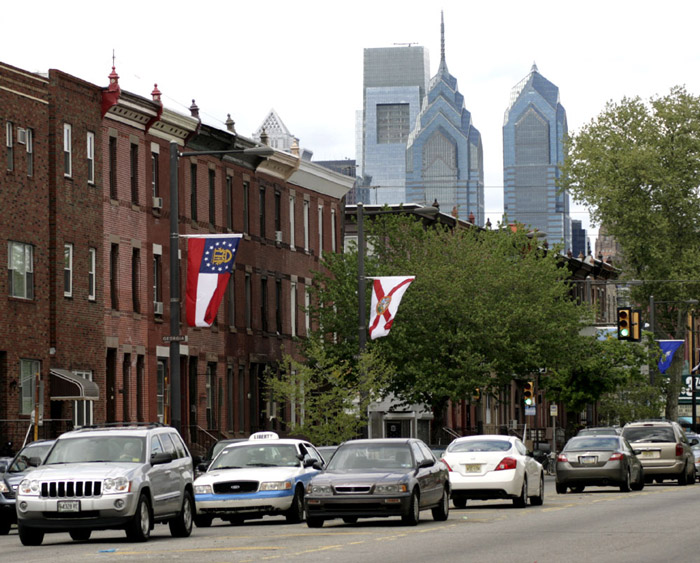 Odd thing about Broad Street in South Philadelphia: people park in the middle of the street.
Odd thing about Broad Street in South Philadelphia: people park in the middle of the street.
Between the northbound and southbound lanes, there is pavement marked with diagonal yellow stripes, the kind of striping that, in all other parts of the world, says to drivers: "Keep your car out of this area." But on Broad Street, at least on the part of Broad Street that runs through South Philly, the empty space between lanes calls out, "Hey, right over here–park your car! Right here in the middle of the street."
Facing north, facing south, doesn't matter. Free parking is free parking.
cars
streetscape
skyline
South Philly
Broad Street
parking
local knowledge
(Image credit: Steve Ives)
Nov 19, 2012
 From the rooftops, here on Kater Street, you can see most of Philadelphia's gap-toothed skyline, such as it is. This is a city that had no tall skyscrapers at all until the late 1980s and does not yet have a critical mass of them, skyline-wise.
From the rooftops, here on Kater Street, you can see most of Philadelphia's gap-toothed skyline, such as it is. This is a city that had no tall skyscrapers at all until the late 1980s and does not yet have a critical mass of them, skyline-wise.
From a few fortunate vantage points around town, the buildings of Center City appear to clump together more or less like a proper downtown. But from most places, including the roofs of Kater Street's two-story row houses, the skyline looks raggedy and disorganized.
Actually, from the roof of our own house up toward the end of the block, you can't see the skyline at all on account of the trees–or at least that was the case last week, when we climbed up there and shot this picture. Since then, the leaves have yellowed and dropped quite suddenly, and we would imagine the view is now only partially blocked, by a lacework of tree branches.
birdseye view
Philadelphia
Kater Street
skyline
skyscrapers
Center City
rooftops
Feb 4, 2013
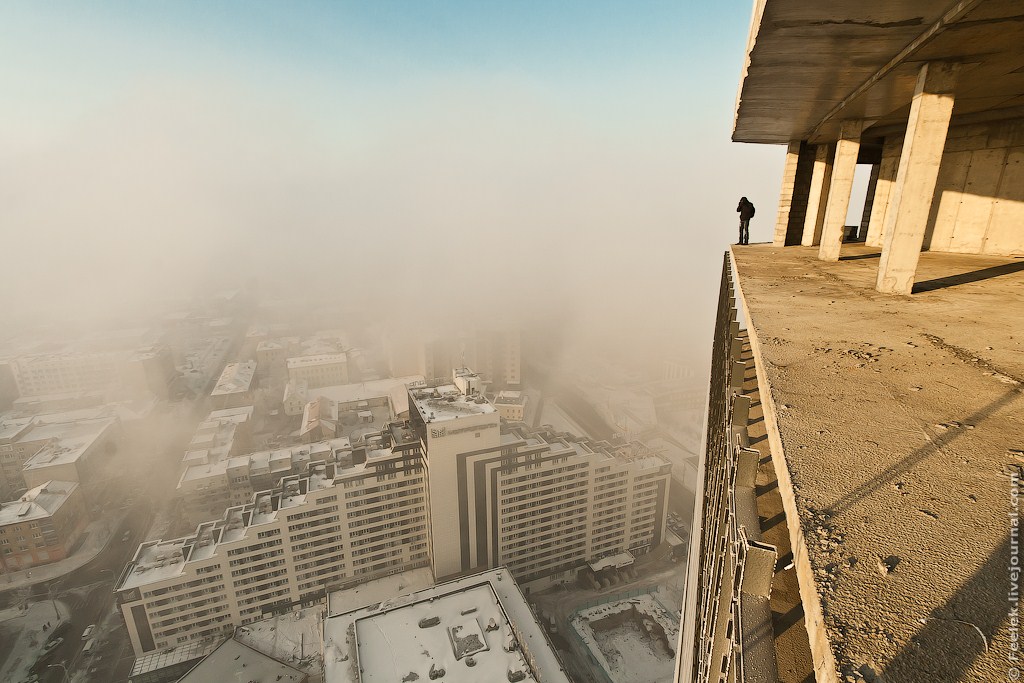 Grand prize winner from the 2012 international SkyscraperCity photo competition.
Grand prize winner from the 2012 international SkyscraperCity photo competition.
Meanwhile, here in Pennsylvania, Punxatawney Phil saw his shadow, foreshadowing an early spring, and the winter weather continues to compare favorably to the conditions suggested in the photo.
cityscape
birdseye view
Siberia
winter
skyline
skyscraper
Krasnoyarsk
(Image credit: Fili via SkyscraperCity)
Feb 25, 2013
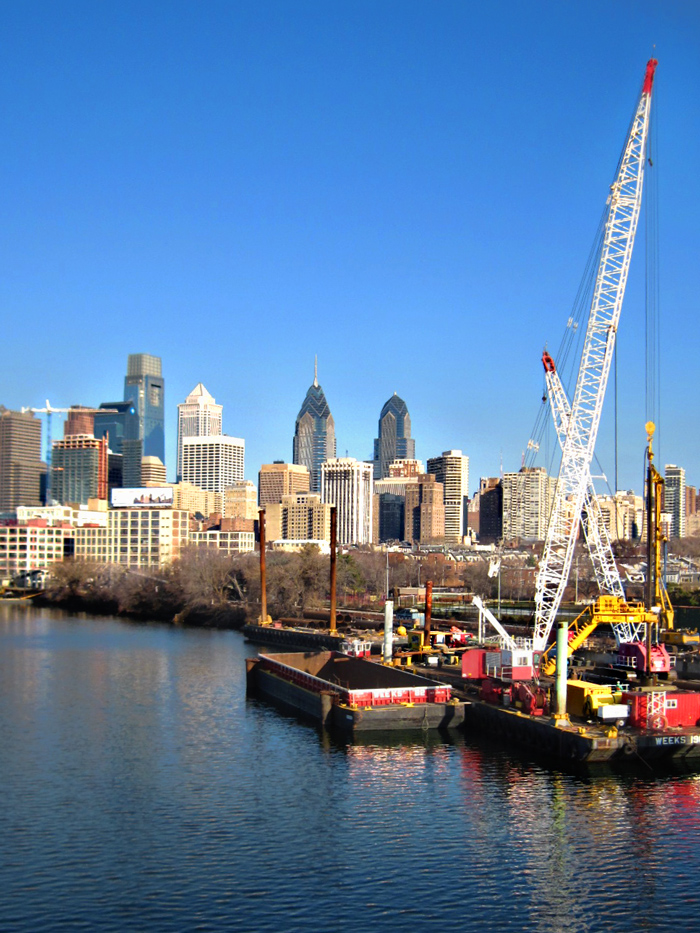 Yesterday, we caught the view from New York City's High Line rails-to-trails boardwalk, a park that winds along the western edge of lower Manhattan, thirty feet up in the sky.
Yesterday, we caught the view from New York City's High Line rails-to-trails boardwalk, a park that winds along the western edge of lower Manhattan, thirty feet up in the sky.
Today's glimpse of a tracks-to-boardwalk project is in Philadelphia, alongside the Schuylkill River, where barge-mounted heavy equipment is currently driving pilings into the riverbed for a boardwalk that will soar out over the water to extend an existing twenty-plus-mile asphalt biking and walking path.
The asphalt path follows an abandoned railroad bed downriver from Valley Forge past Fairmount Park and the Philadelphia Art Museum and on into Center City. But at Locust Street, the trail ends abruptly, crowded off the riverbank by half a dozen railroad lines that are definitely not-yet-abandoned.
The plan is to extend the path southward by snaking it out over the river as a boardwalk with observation platforms and maybe some fishing decks. (Although the Schuylkill is a bit shy of what you'd call a pristine river, there are definitely fish swimming in it, and they are catchable, if not eatable.)
After about half a mile over water, the new boardwalk will pass under the South Street Bridge and then curve back onto dry land for the remainder of its route. It will terminate in southwest Philly at Bartram's Gardens, an eighteenth-century homestead where America's earliest botanists planted the New World's first collection of botanical curiosities.
Planned completion date for the boardwalk is . . . early 2013, or so it is written. Whenever.
cityscape
railroad
Philadelphia
work
Schuylkill River
skyline
crane
barge
(Image credit: Tina Lackeos)
Mar 9, 2013
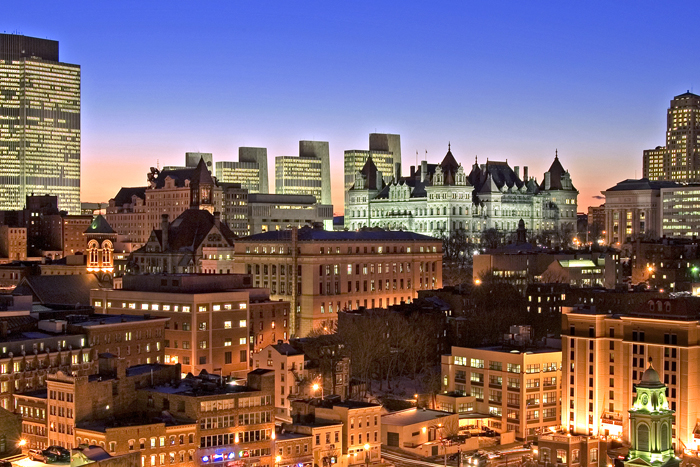 Nice looking skyline, is it not? The city is Albany, New York, which may or may not be a nice place to live or even a nice place to visit; I've never been there and yet . . . here I am squawking about it.
Nice looking skyline, is it not? The city is Albany, New York, which may or may not be a nice place to live or even a nice place to visit; I've never been there and yet . . . here I am squawking about it.
It's actually one of the oldest continuously inhabited cities in the Western Hemisphere, founded in the early seventeenth century as Beverwijk, a Dutch village outside the gates of Fort Orange. Beverwijk was renamed Albany when the English took over in the mid-century, and in 1686, the city was officially incorporated under a charter that is said to be one of America's oldest governing documents still in effect.
Albany was also the eastern terminus of the Erie Canal and for many years produced beer that was shipped westward on the canal to all the thirsty pioneers out in the hinterlands.
The painting below shows Albany's North Pearl Street in approximately 1800.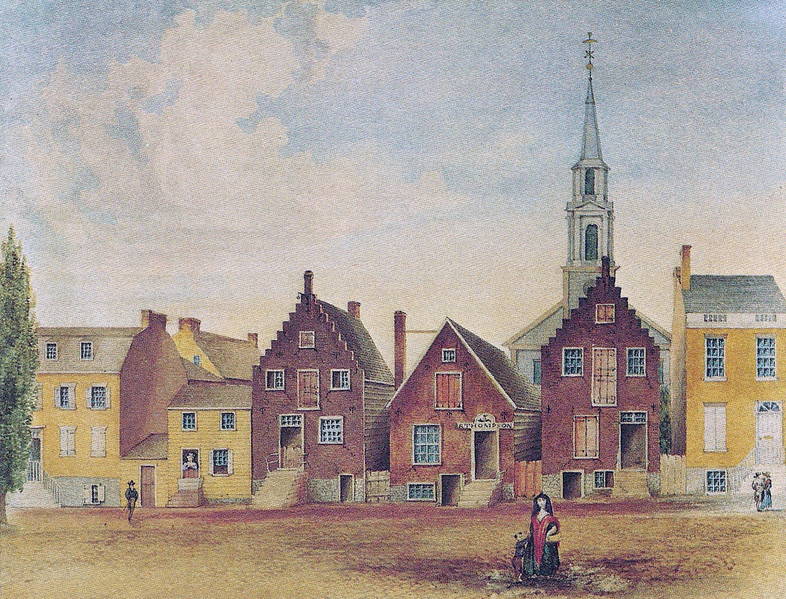
New York
cityscape
art
streetscape
skyline
Albany
1800
(Photo h/t skyscrapercity.com; Artwork by James Eights)
Jul 15, 2013
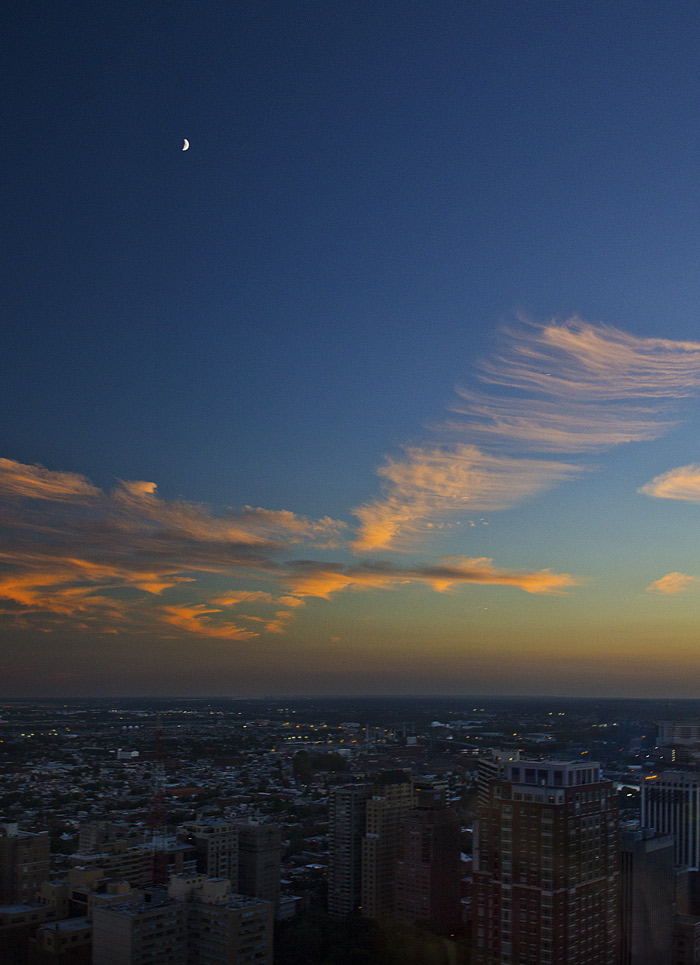 Looking out over Philadelphia through the window of a restaurant on the 37th floor of 2 Liberty Place, a downtown skyscraper.
Looking out over Philadelphia through the window of a restaurant on the 37th floor of 2 Liberty Place, a downtown skyscraper.
cityscape
birdseye view
night
sunset
Philadelphia
sky
skyline
skyscrapers
Center City
Jul 19, 2013
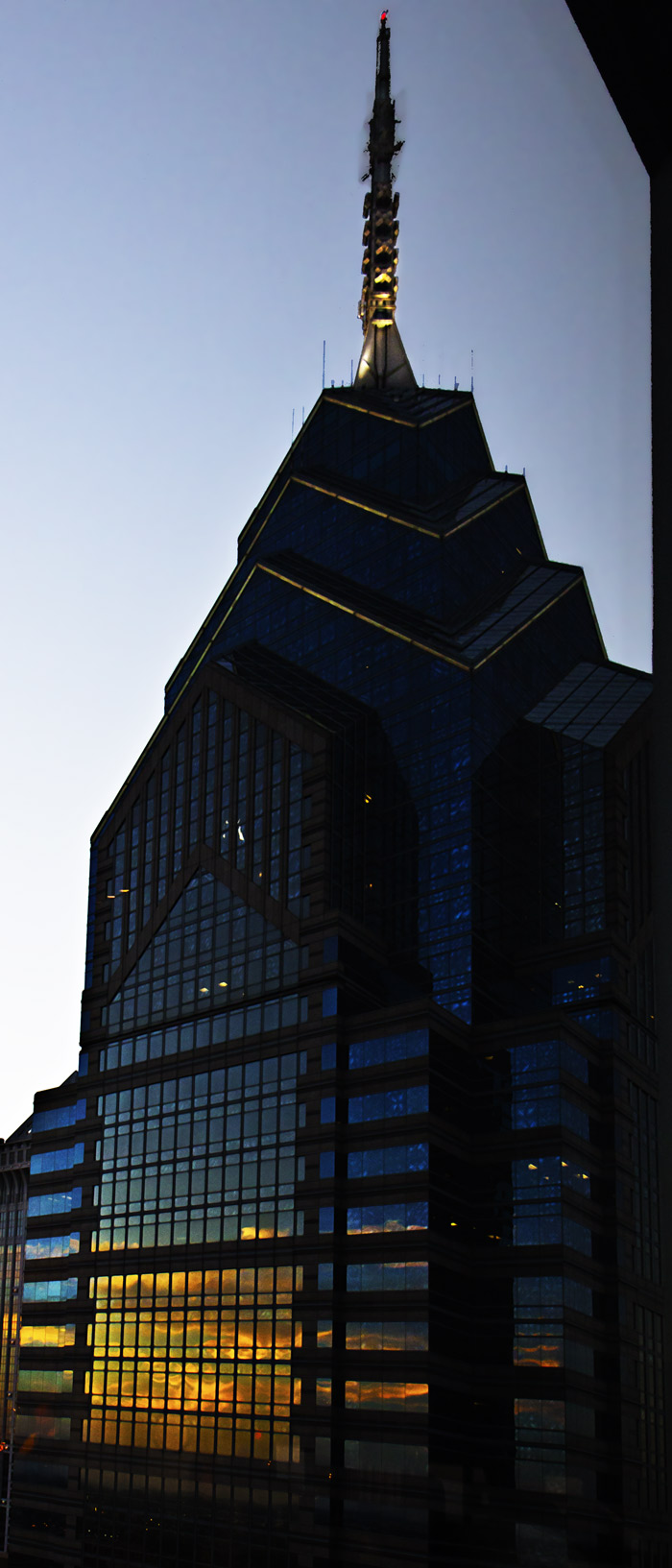 The top of One Liberty Place, way above the setting sun, as viewed from about 500 feet up in Two Liberty Place, a block away.
The top of One Liberty Place, way above the setting sun, as viewed from about 500 feet up in Two Liberty Place, a block away.
The spire of One Liberty Place is said to top out 945 feet above the ground.
cityscape
night
sunset
skyline
clouds
One Liberty Place
skyscraper
reflection
Philly
Oct 15, 2013
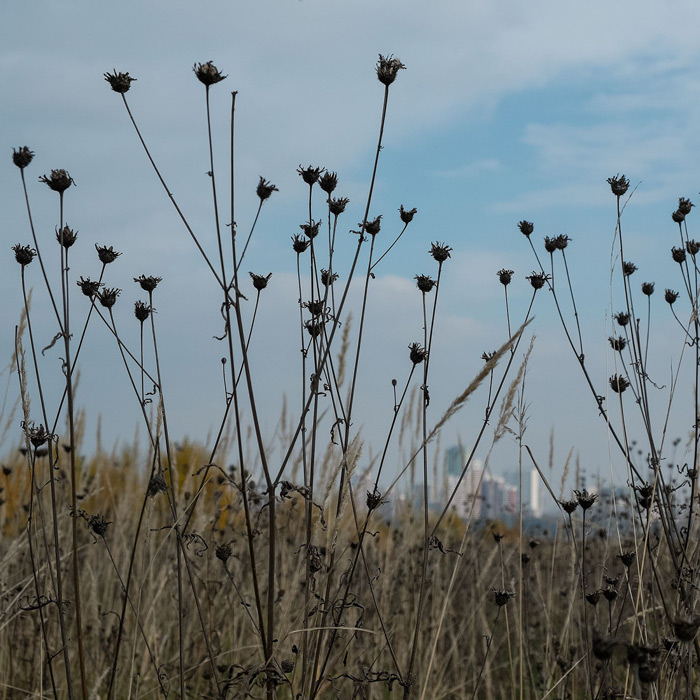 Moscow in the background.
Moscow in the background.
landscape
cityscape
fall
Moscow
skyline
(Image credit: Andrey Ilyin)
Nov 7, 2013
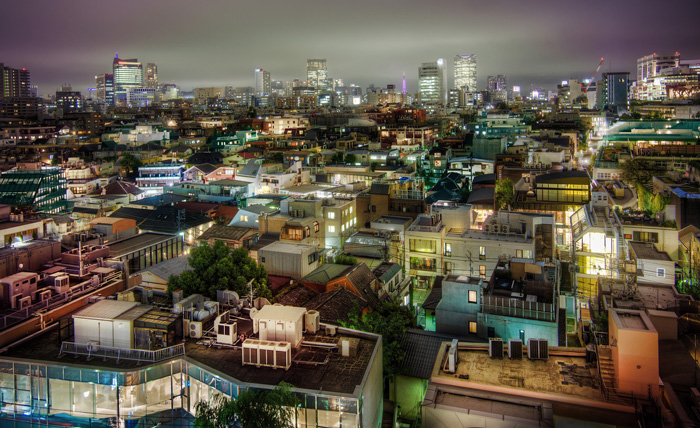 Photographer Trey Ratcliff called this picture "The Infity of Tokyo."
Photographer Trey Ratcliff called this picture "The Infity of Tokyo."
cityscape
aerial view
birdseye view
night
Japan
skyline
skyscrapers
Tokyo
heat island
(Image credit: Trey Ratcliff via Stuck in Customs)
Feb 19, 2014
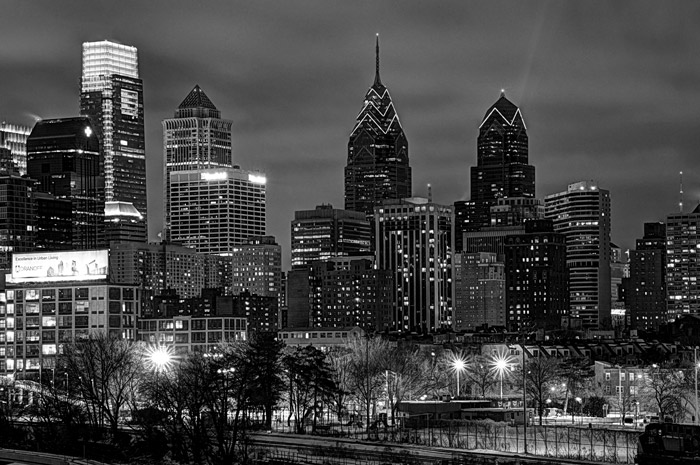
cityscape
night
skyline
Philly
(Image credit: Little Fuji)
Aug 13, 2014
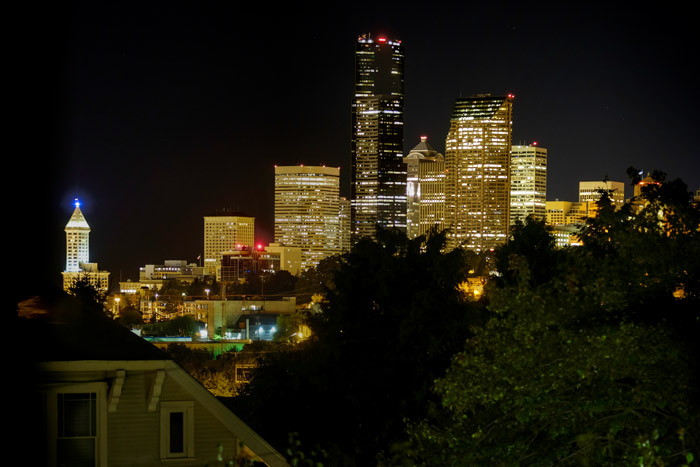 Downtown Seattle on a clear summer night, as seen from a hill near the stadiums.
Downtown Seattle on a clear summer night, as seen from a hill near the stadiums.
cityscape
night
skyline
Seattle
(Image credit: Fuji T)
Aug 25, 2014

This is the story we heard Saturday on the street. Of course, none of it is confirmed.
So. There's this guy who bought a penthouse atop a nice new condo tower on 18th Street, half a block north of Rittenhouse Square. His unit includes a nice big terrace that wraps around at least two sides of the building; his views must include virtually all of downtown Philadelphia and beyond. Expansive, and no doubt expensive.
But not good enough. He didn't like his windows, we're told. He wanted to replace them with better windows and, apparently, more windows. He wanted lots and lots of really, really big windows. Three long trailer trucks full of windows.
Problem was, the new windows wouldn't fit in the elevator to get them up to his penthouse.
He needed a crane, and not just any crane. To operate in the cramped confines of a narrow city street laid out in the days of William Penn, the crane had to lift glass straight up for hundreds of feet and then rotate without bumping into any of the buildings thereabouts and deposit the glass gently on the penthouse terrace. Vehicular traffic could be blocked during this process, but not pedestrian traffic; nearby businesses wanted to keep their doors open the entire time.
There were only three cranes on the east coast, we were told, that could handle this sort of job. One of them was hauled to Rittenhouse Square on Saturday morning. In pieces.
Another crane was needed to help put the big crane together. In case you were wondering, the pieces are held together with big cotter pins.
Police officers were needed to direct traffic around the closed-off block. City buses were rerouted and sometimes delayed, forced into attempting painstaking tight turns onto streets not really suitable for them.
Two large crews of workmen were on duty all day, a crew of heavy equipment guys and a crew of glaziers from Local 262.
So there's the cost of the new windows, and of a rare, expensive crane that had to be assembled by a second crane, plus three tractor trailers to haul in the windows, various vehicles to haul the parts of the cranes, two crews at union wages, lots of expensive permits to block a street and redirect traffic and park all the trucks all day . . .
And then later, after all the new windows are up on the penthouse terrace, there will be the expense of removing the old windows, redoing the walls to accommodate the new windows, installing them . . .
We were told $250,000. Does that sound right to you?
streetscape
work
skyline
crane
Philly
Rittenhouse
abstract
(h/t: C Duffy)
(Image credit: Fuji T)
Nov 6, 2014
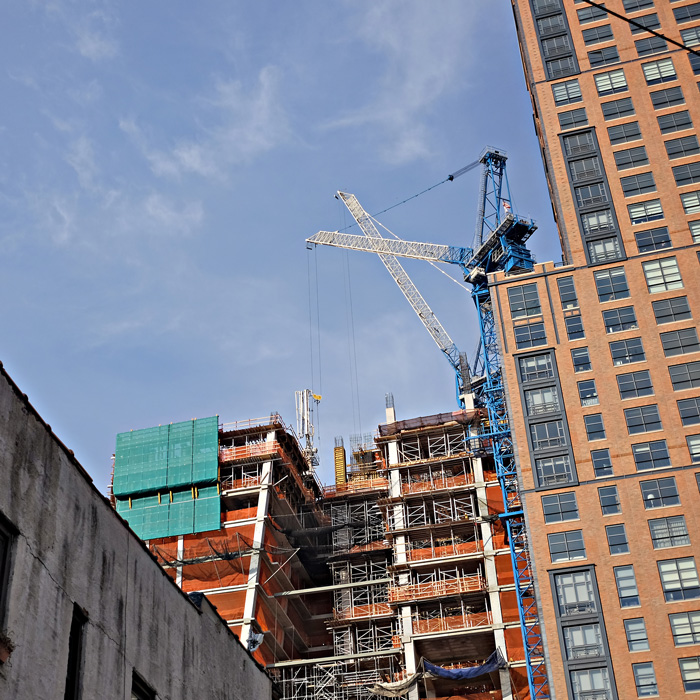 Two cranes get their act together high in the sky above New York City's High Line promenade.
Two cranes get their act together high in the sky above New York City's High Line promenade.
Many, many cranes are hard at work these days in that neck of the woods; apparently, real estate developers are firmly of the opinion that people will pay even more than the usual Manhattan rates to live in an apartment or condo near the High Line. They may be right; nobody's yet found the ceiling on what New Yorkers will pay for anything.
New York
Manhattan
cityscape
cranes
skyline
skyscrapers
High Line
(Image credit: Fuji T)
Dec 22, 2014
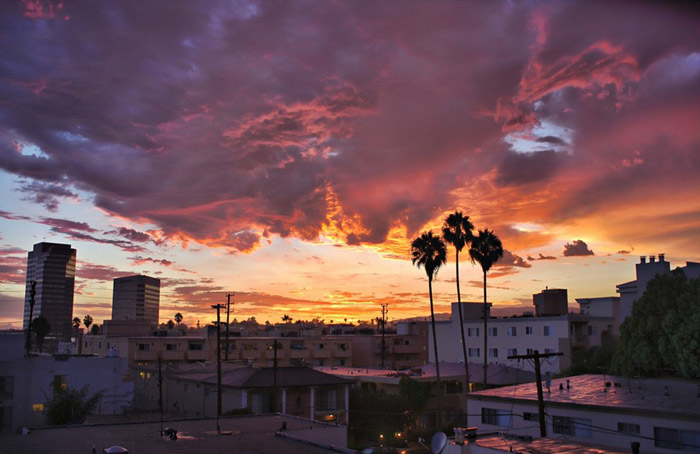 Finally, the rains have come back to California. Recently, as the sun was going down over Los Angeles, a downpour was letting up.
Finally, the rains have come back to California. Recently, as the sun was going down over Los Angeles, a downpour was letting up.
cityscape
sunset
California
sky
skyline
clouds
Los Angeles
drought
rain
(Image credit: Lectrolink)
Dec 29, 2014
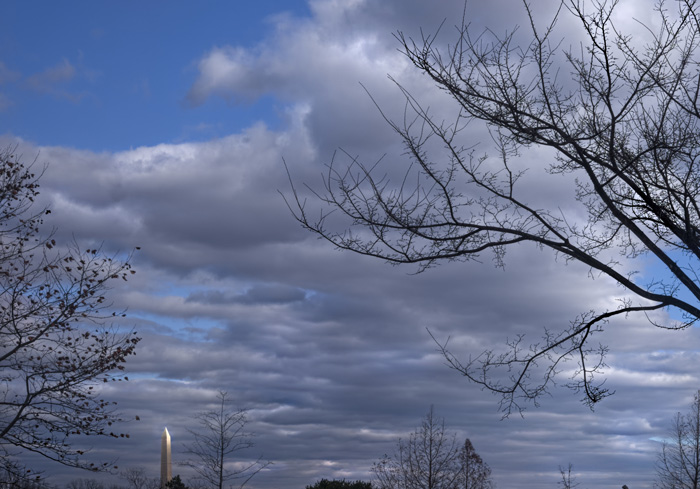 The only skyscraper in the city of Washington, as glimpsed from Arlington National Cemetery.
The only skyscraper in the city of Washington, as glimpsed from Arlington National Cemetery.
Washington
winter
sky
skyline
clouds
Washington Monument
Arlington National Cemetery
D.C.
(Image credit: Fuji T)
Jan 23, 2015
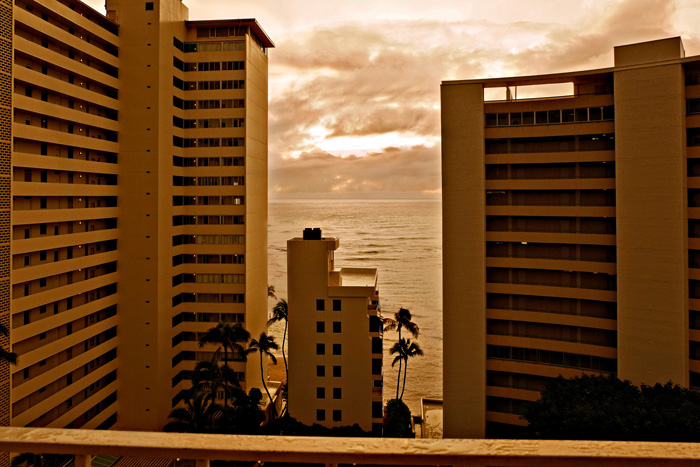 Waikiki
Waikiki
beach
cityscape
sunset
sky
skyline
palm trees
Hawaii
Honolulu
(Image credit: Little Fuji)
Jan 26, 2015
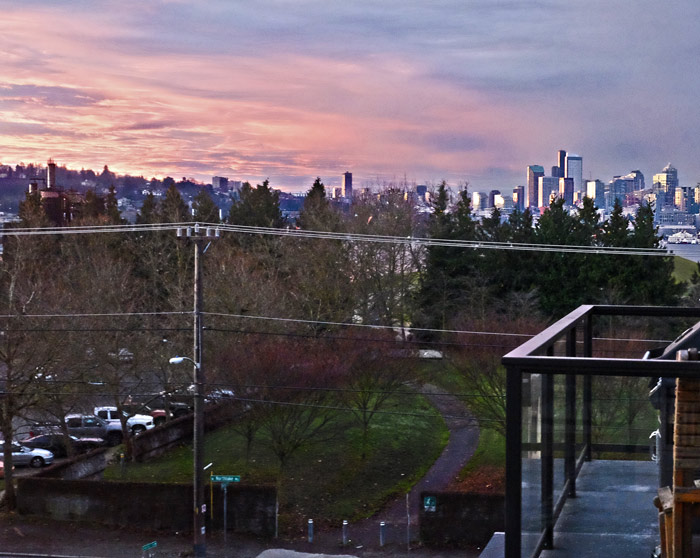 The sun rises over Gasworks Park and Lake Union in Seattle, or at least it tries to. The clouds scuttling into town from the the west (right edge of this picture) are about to roll all over the golden disk and thus reestablish normal winter gloom.
The sun rises over Gasworks Park and Lake Union in Seattle, or at least it tries to. The clouds scuttling into town from the the west (right edge of this picture) are about to roll all over the golden disk and thus reestablish normal winter gloom.
cityscape
dawn
skyline
Seattle
sunrise
Gasworks Park
Lake Union
(Image credit: Fuji T)
(h/t: Amy and Allen)
Apr 20, 2015
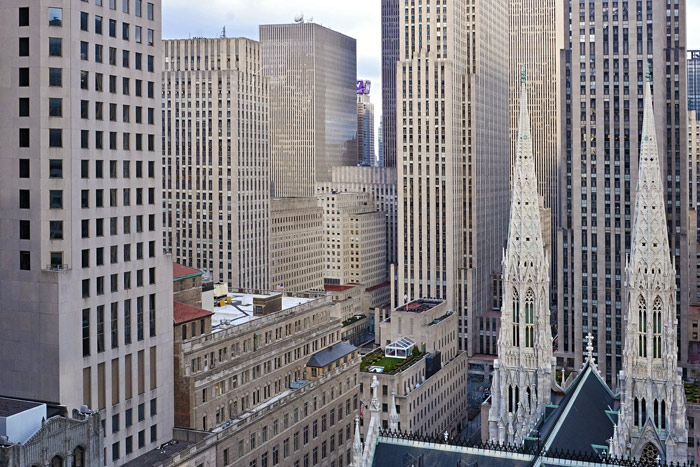 St. Patrick's Cathedral from behind and a little bit above, in midtown Manhattan. We enjoyed this view from the window of our hotel room during a recent trip to New York.
St. Patrick's Cathedral from behind and a little bit above, in midtown Manhattan. We enjoyed this view from the window of our hotel room during a recent trip to New York.
New York
Manhattan
skyline
skyscrapers
rooftops
St. Patrick's Cathedral
midtown
spires
(Image credit: Fuji T)
Feb 25, 2016
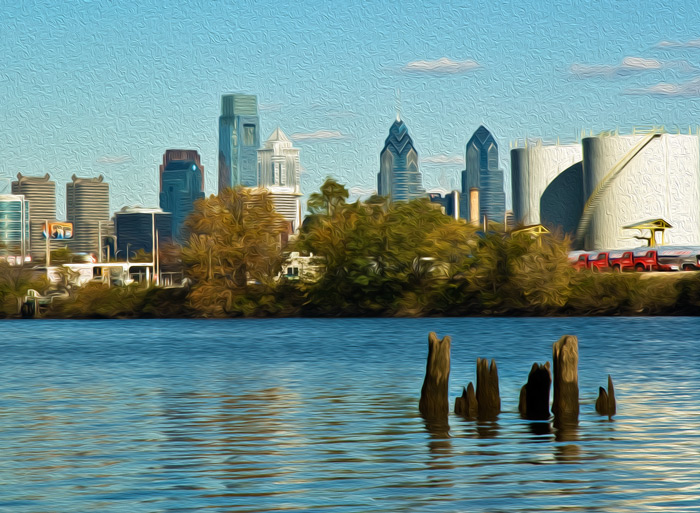 In the mid-eighteenth century, Ben Franklin's good friend John Bartram was a nurseryman, with a plant and seed business on a few acres across the Schuylkill River from Phladelphia. This is the view today from Bartram's estate, which is now owned by the city.
In the mid-eighteenth century, Ben Franklin's good friend John Bartram was a nurseryman, with a plant and seed business on a few acres across the Schuylkill River from Phladelphia. This is the view today from Bartram's estate, which is now owned by the city.
The oil tanks are part of the largest refinery complex in the northeast, recently acquired from Sunoco by an investment fund that operates it as Philadelphia Energy Solutions. This year's low oil prices don't seem to hurt the storage-and-refinery end of the oil business; PES says it has expanded its operation locally to employ more than 1,000 people and is trying to acquire a storage facility in North Dakota.
Bartram had an international reputation as a botanist, collecting seeds and plant specimens from all over the thirteen colonies and beyond, from Florida to Lake Ontario. Much of his traveling was by foot. He sent unique New World plants to London for the king's botanists there; they in turn sent him English plants that might or might not be suitable for American climes, including some trees and shrubs that survive today in Bartram's garden.
His son Bill continued the nursery business and also wrote a best-selling travelogue about plant-collecting adventures. Bill's niece Ann then took over the place and expanded it to include ten greenhouses and many acres of nursery gardens; in 1850, however, Ann and her husband Bob Carr ran out of money and had to sell the place.
landscape
oil
Schuylkill River
skyline
industry
Sunoco
Philadelphia Energy Solutions
John Bartram
Mar 5, 2016
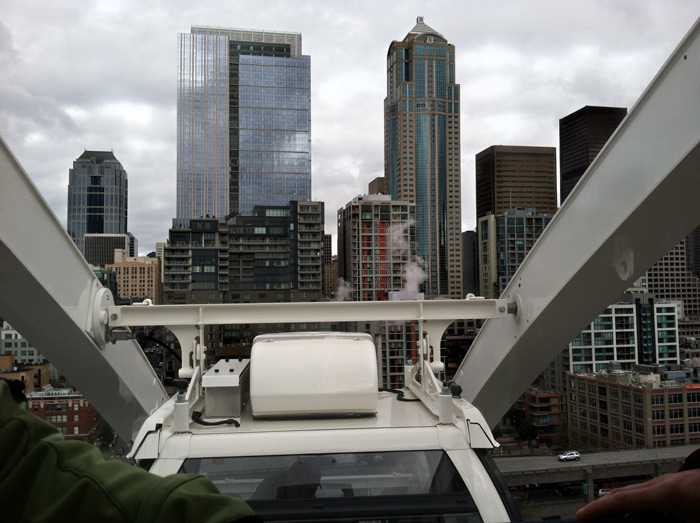 Downtown Seattle in the wintertime, as seen from the ferris wheel on the waterfront.
Downtown Seattle in the wintertime, as seen from the ferris wheel on the waterfront.
birdseye view
winter
skyline
skyscrapers
Seattle
May 17, 2016
 Let's just not go there with the hypertension thing, though it's a real deal, all properly proclaimed. But today is way too remarkable for other reasons.
Let's just not go there with the hypertension thing, though it's a real deal, all properly proclaimed. But today is way too remarkable for other reasons.
To start with, very close to home, we celebrate May 17 as the birthday of our little sister Carol, as well as the birthday, on the Stein side of the family, of our brother-in-law Bob, as well as the wedding anniversary of Richard and Arleigh Stein, as well as the 480th anniversary of the annulment of the marriage of Anne Boleyn and King Henry VIII of England.
Not only, not only. The very day of little sister's birth in 1954 is also known to history as the day the U.S. Supreme Court announced its decision in Brown v. Board of Education, knocking the legalistic props out from under racial segregation in public schools, though of course failing to end racial segregation in public schools. And there's more, at least on a technicality: the Brown decision applied only to public schools run by the various state governments, not to schools in the District of Columbia, where everything was run by the federal government and also where, it so happened, our little sister was born. The Supreme Court needed to decide a separate case, Bolling v. Sharpe, to order desegregation of schools in Washington, D.C., but it efficiently took care of that detail on the very same day as little sister's birth. Eight days later, the D.C. School Board announced a desegregation plan, and thus, had little sister been smart enough to start school as a newborn infant, which she very nearly was, she might have enrolled in a newly desegregated classroom.
The photo above shows a bit of what Sis is up to these days: mosaicking the side of her garage to suggest a door and some pretty awesome windows.
art
trompe l'oeil
skyline
skyscrapers
mosaic
Arizona
(Art by C. Fuchs)
tiles
(Image credit: C. Fuchs)
Jun 6, 2016
 An old skyscraper, the Art Deco Suburban Station building from 1930, peeks out at left from behind Philadelphia's newest and tallest skyscraper, the Comcast Center, completed in 2008. Reflected in the angled blue glass of the Concast tower are the upper floors of the Mellon Bank Center across the street.
An old skyscraper, the Art Deco Suburban Station building from 1930, peeks out at left from behind Philadelphia's newest and tallest skyscraper, the Comcast Center, completed in 2008. Reflected in the angled blue glass of the Concast tower are the upper floors of the Mellon Bank Center across the street.
Behind the 'scrapers is lots and lots of city sprawling into the night across the Delaware Valley.
Comcast is currently building itself a newer and even taller tower, which is rising off to the right of the buildings seen here. The lower floors will be occupied by Comcast and Telemundo, and the upper floors will be rooms with a view in a Four Seasons Hotel.
cityscape
birdseye view
sunset
Philadelphia
skyline
Center City
Comcast Center
windowscape
Mellon Bank Center
Suburban Station
architectureskyscrapers
(Image credit: Fuji T)
Mar 18, 2017
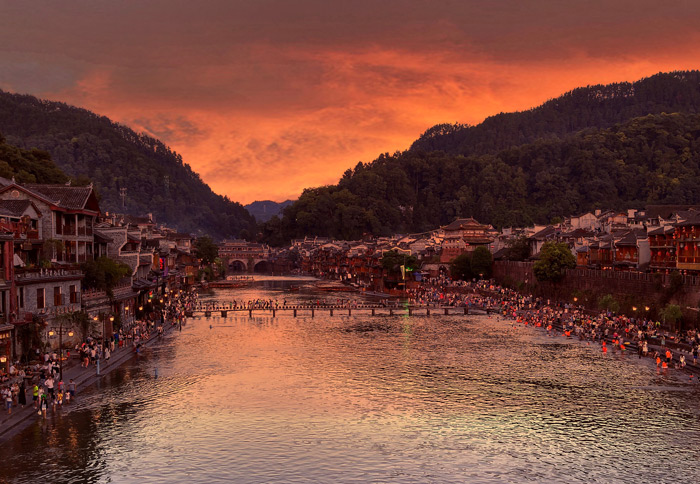 An uncropped version of this photo took first place in a contest defined as "Big rivers and the life along them." It was shot with an Android cellphone.
An uncropped version of this photo took first place in a contest defined as "Big rivers and the life along them." It was shot with an Android cellphone.
The river is the Li, in south China, and the lively village is Fenghuang.
landscape
sunset
China
skyline
River Li
Fenghuang
(Image credit:microsurgeon via dpreview)
Mar 20, 2017
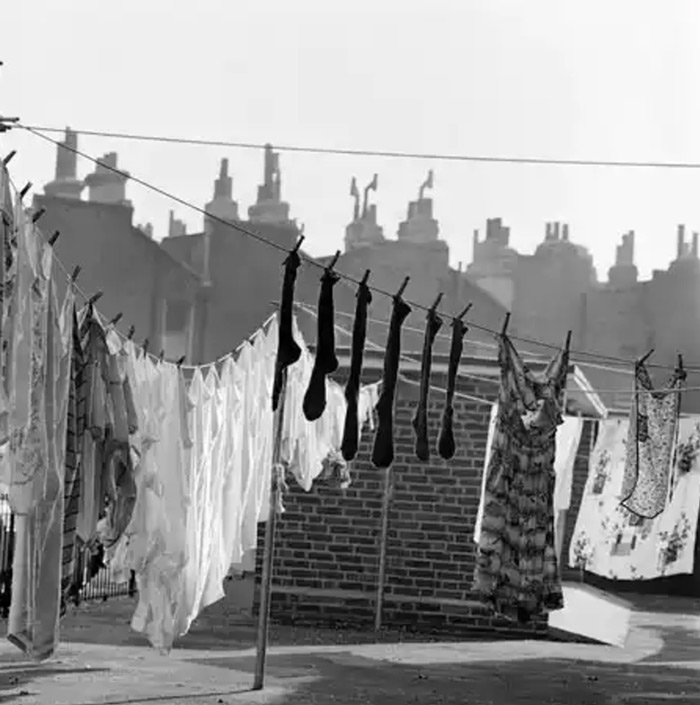 In 1960, British photographer John Gay (who was actually born Hans Göhler, in Karlsruhe, Germany) shot these clotheslines in front of the chimneyline of Islington, London.
In 1960, British photographer John Gay (who was actually born Hans Göhler, in Karlsruhe, Germany) shot these clotheslines in front of the chimneyline of Islington, London.
A confession: I miss clotheslines. Don't miss lugging baskets of soggy clothes up the basement steps and out across the yard. Don't miss slapping at mosquitoes with a mouthful of clothespins. Don't miss convincing myself it won't rain when of course it will, and it does. Don't miss how stiff the clothes are when they're finally back inside.
I just miss seeing clotheslines when I walk the streets and alleys of my neighborhood, or any neighborhood. Nowadays, backyards look lifeless and uninteresting. Doubtless, this is a small price to pay for progress, and this nostalgia of mine is a small and silly thing, but still.
So now and for a while to come, Monday will be laundry day on Hole in the Clouds.
cityscape
laundry
London
skyline
clothesline
roofscape
1960
Islington
chimneys
(Image credit: John Gay)
Apr 4, 2017
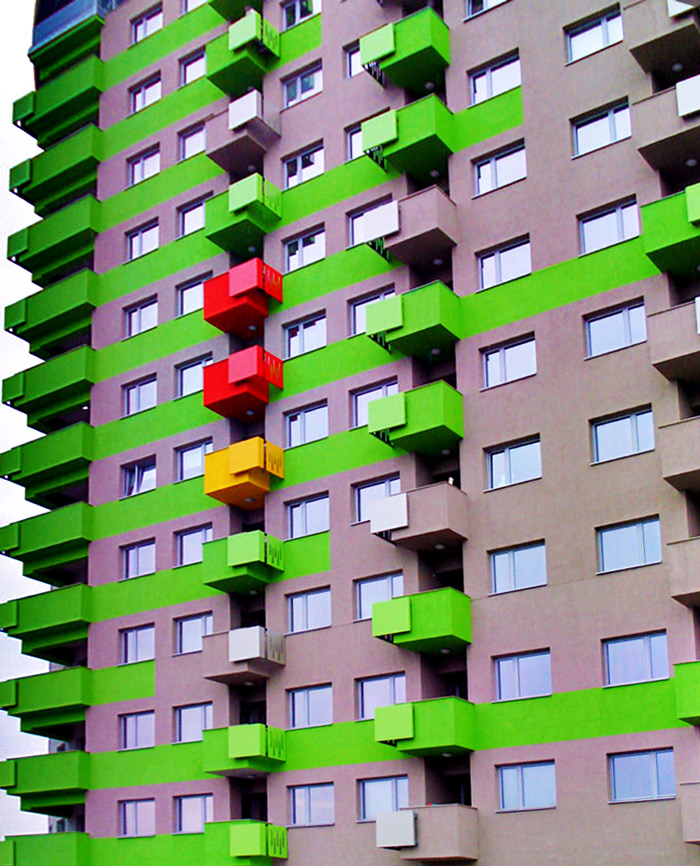
Two apartment towers in Skopje, Republic of Macedonia. Above, City Tower; below, a building in the Skarpoš district.
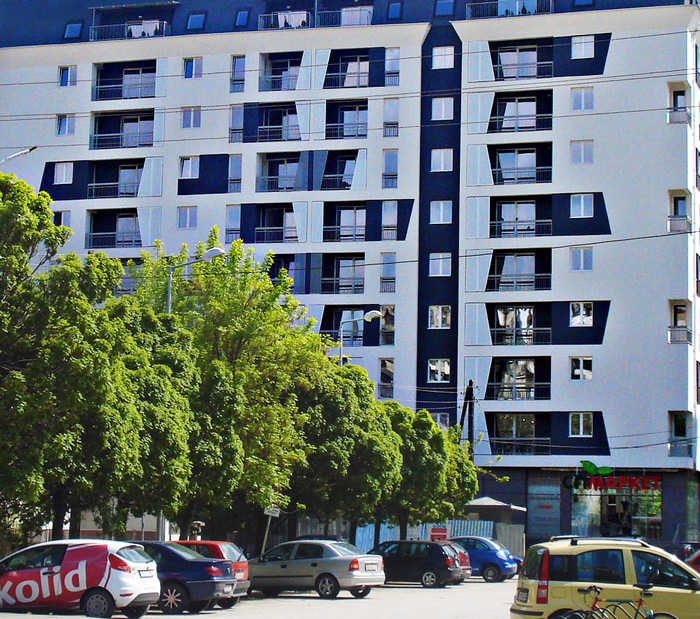
cityscape
architecture
skyline
Skopje
apartments
Republic of Macedonia
(Image credits: George K. 1981)
Jan 17, 2018
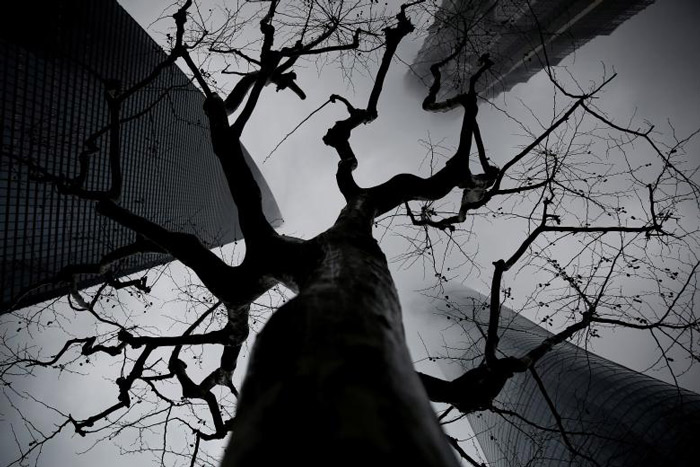 Fog swallows the tips of new skyscrapers around an old tree in the Pudong Financial District of Shanghai.
Fog swallows the tips of new skyscrapers around an old tree in the Pudong Financial District of Shanghai.
Shanghai
China
tree
skyline
skyscrapers
fog
Pudong Financiall District
(Image credit: Aly Song for Reuters)











 The blimp sails past the Comcast Center, tallest building in Philadelphia.
The blimp sails past the Comcast Center, tallest building in Philadelphia.






 The top of One Liberty Place, way above the setting sun, as viewed from about 500 feet up in Two Liberty Place, a block away.
The top of One Liberty Place, way above the setting sun, as viewed from about 500 feet up in Two Liberty Place, a block away.


















 Fog swallows the tips of new skyscrapers around an old tree in the Pudong Financial District of Shanghai.
Fog swallows the tips of new skyscrapers around an old tree in the Pudong Financial District of Shanghai.